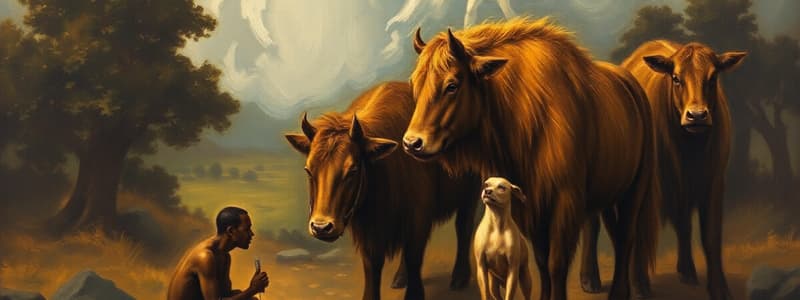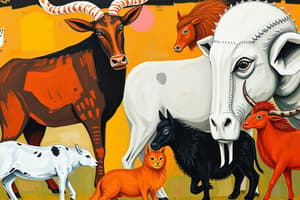Podcast
Questions and Answers
What is a characteristic of strict captivity in the domestication process?
What is a characteristic of strict captivity in the domestication process?
- Encouraging genetic diversity
- Encouraging wild species integration
- Limiting breeding opportunities (correct)
- Promoting natural selection
What does the term 'Genetic Firewall' refer to in the context of domestication?
What does the term 'Genetic Firewall' refer to in the context of domestication?
- A method to enhance inherited traits
- A strategy to maintain wild species genes
- Promoting hybridization with wild species
- Minimizing genetic contribution from wild species (correct)
Which animal is NOT listed as one that underwent self-domestication?
Which animal is NOT listed as one that underwent self-domestication?
- Horse (correct)
- Pig
- Cat
- Dog
What is the primary distinction between self-domestication and intentional domestication?
What is the primary distinction between self-domestication and intentional domestication?
Which of the following animals was domesticated from the European Wild Boar?
Which of the following animals was domesticated from the European Wild Boar?
What is the primary energy characteristic of carbonaceous roughages?
What is the primary energy characteristic of carbonaceous roughages?
Which of the following is a plant source of protein concentrate with a crude protein content of 30-45%?
Which of the following is a plant source of protein concentrate with a crude protein content of 30-45%?
What function do nutrient additives serve in animal feed?
What function do nutrient additives serve in animal feed?
Which of the following is a non-nutrient additive used to alter metabolism?
Which of the following is a non-nutrient additive used to alter metabolism?
Which feed additive type is essential for life support?
Which feed additive type is essential for life support?
What is one of the main practices of specialization in animal breeding?
What is one of the main practices of specialization in animal breeding?
Which animal is primarily associated with fiber production in the form of hair?
Which animal is primarily associated with fiber production in the form of hair?
What is a significant consequence of the genetic firewall technique in animal breeding?
What is a significant consequence of the genetic firewall technique in animal breeding?
Which type of horse is characterized by its ability to operate in a variety of climates?
Which type of horse is characterized by its ability to operate in a variety of climates?
Domestication of animals often leads to changes in which aspect?
Domestication of animals often leads to changes in which aspect?
What is an important aspect that contributes to the purpose of digestion in animals?
What is an important aspect that contributes to the purpose of digestion in animals?
Which of the following is NOT a domesticated wild species typically referenced?
Which of the following is NOT a domesticated wild species typically referenced?
What factor is affected by domestication concerning animal products?
What factor is affected by domestication concerning animal products?
What is the primary function of macrominerals such as calcium in the body?
What is the primary function of macrominerals such as calcium in the body?
Which nutrient class is essential for energy storage and insulation in the body?
Which nutrient class is essential for energy storage and insulation in the body?
What is one main difference between ruminants and monogastrics regarding protein digestion?
What is one main difference between ruminants and monogastrics regarding protein digestion?
Which vitamin is primarily responsible for blood clotting?
Which vitamin is primarily responsible for blood clotting?
What distinguishes microminerals from macrominerals?
What distinguishes microminerals from macrominerals?
Which of the following vitamins can be stored in the body?
Which of the following vitamins can be stored in the body?
Which nutrient is primarily composed of amino acids and has various structural roles in the body?
Which nutrient is primarily composed of amino acids and has various structural roles in the body?
What is the primary role of digestible energy in animal nutrition?
What is the primary role of digestible energy in animal nutrition?
Which nutrient class is commonly regarded as the most limiting in animal diets?
Which nutrient class is commonly regarded as the most limiting in animal diets?
What is the chemical formula representation of sucrose?
What is the chemical formula representation of sucrose?
Which type of carbohydrates are primarily used as energy substrates for ruminants?
Which type of carbohydrates are primarily used as energy substrates for ruminants?
What are the two categories of soluble vitamins?
What are the two categories of soluble vitamins?
How much water can a camel lose without significant harm?
How much water can a camel lose without significant harm?
What is the energy content of fats compared to carbohydrates?
What is the energy content of fats compared to carbohydrates?
Which of the following is NOT a type of carbohydrate mentioned?
Which of the following is NOT a type of carbohydrate mentioned?
Which nutrient is a component of proteins that is NOT a carbohydrate?
Which nutrient is a component of proteins that is NOT a carbohydrate?
Flashcards are hidden until you start studying
Study Notes
Domestication
- Self Domestication – Species selected by the environment based on adaptability for survival (e.g., village dump analogy)
- Intentional Domestication - Humans control the breeding and development of species by controlling movement, sex ratios, and age structures
Specialization
- Strict Captivity – Limiting breeding to select desired traits
- Intentional Breeding – Selective breeding for desired traits
- Trait Standardization – Establishing a consistent, desired phenotypic expression
- Genetic Firewall – Minimizing genes from wild species
Domesticated Species
- Dogs (Canine) - Domesticated from wolves around 12,000–10,000 years ago, multiple ancestral wolf populations involved (e.g., Arabian, Chinese, Indian and European)
- Pigs (Porcine) – Domestication process traced to the European Wild Boar and East Indian Pig
- Cats (Feline) – Originated from European Wildcats and African/Asian Wildcats
- Mice (Murine) – Domestication process not well delineated
- Sheep (Ovine) – Domesticated from the Mouflon, primarily for wool and meat
- Goats (Caprine) – Domesticated from the Bezoar and Ibex, primarily for milk, meat, and fiber
- Cattle (Bovine) – Domesticated from the Aurochs, raised for meat, milk, and labor (drafting)
- Horses (Equine) – Domesticated for various purposes and breeds, categorized by their body type, temperament, and purpose: Heavy (cold), light (hot), and Warmblood.
- Donkeys (Equine) – Originated from African Equus africanus asinus
- Llamas (Camelidae) - South American domesticated species
- Red Jungle Fowl (Galliformes) - Asia, wild ancestor of domestic chickens
- Turkeys (Galliformes) - New World species, domesticated in North America
- Guinea Pigs (Cavies) - Domesticated in South America
- Rabbits (Leporidae) - Europe
- Reindeer (Rangifer tarandus) - Domesticated in Russia and Scandinavian countries
Wild Species
- Musk Ox - North America
- Water Buffalo - Asia & Africa
- Yak - Asia
- Dromedary Camel (Camelus dromedarius) - Domesticated, one hump
- Bactrian Camel (Camelus bactrianus) - Two humps, Asian wild species
Non-Domesticated Species
- Ornamental Fish - 90% saltwater species, >90% freshwater species
Domestication Results
- Changes in behavior – Tameness, size, appearance, reproductive changes, growth rates
- Increased Production – Greater quantity and quality of products (e.g., meat, wool, milk).
Digestive Systems and Strategies
- Nutrient Requirements - Water, energy, protein, vitamins, and minerals
- Water - Camels can lose up to 25% of their body water but can consume over 100 liters (25 gallons).
- Energy – Energy is often the most limiting nutrient (key concern when balancing a ration).
- Carbohydrates –
- Monosaccharides – Glucose, fructose, galactose
- Disaccharides – Sucrose (glucose + fructose), lactose (glucose + galactose), maltose (glucose + glucose).
- Polysaccharides - Glucose polymers (e.g., starch).
- Lipids - Fats provide ~2.25x the energy of carbohydrates. Sources include animals and plants.
- Protein - Amino acids make up muscle, tendons, ligaments, and connective tissue. Ruminants obtain protein from diet and microbes, while monogastrics rely solely on diet.
- Vitamins - Fat-soluble (A, D, E, K) and Water-soluble (C, B, B-complex).
- Minerals – Divided into macrominerals and microminerals.
- Macrominerals – Calcium (Ca), Sodium (Na), Potassium (K), Chlorine (Cl).
- Microminerals – Iron (Fe), Iodine.
- Energy Utilization – Gross Energy (GE) → Digestible Energy (DE) → Metabolic Energy (ME) → Net Energy (NE)
Feedstuffs
- Roughages - Carnaceous – high in fiber (low energy). Protein sources: Animal and Plant
Concentrates
- High energy – low in fiber.
- Protein Concentrates – Animal Sources: Meat and Bone Meal, Blood Meal, Fish Meal.
- Protein Concentrates - Plant sources – oilseeds: Cottonseed Meal, Soy Bean Meal, Linseed Meal
Feed Additives
- Nutrient Additives - Essential for supporting life (e.g., salt, trace mineral blocks).
- Non-Nutrient Additives – Alter metabolism (e.g., antibiotics, yeast cultures, ionophores).
Feed Processing
- Mixing – Blending different components of feedstuffs (e.g., forages, concentrates, additives).
Studying That Suits You
Use AI to generate personalized quizzes and flashcards to suit your learning preferences.




